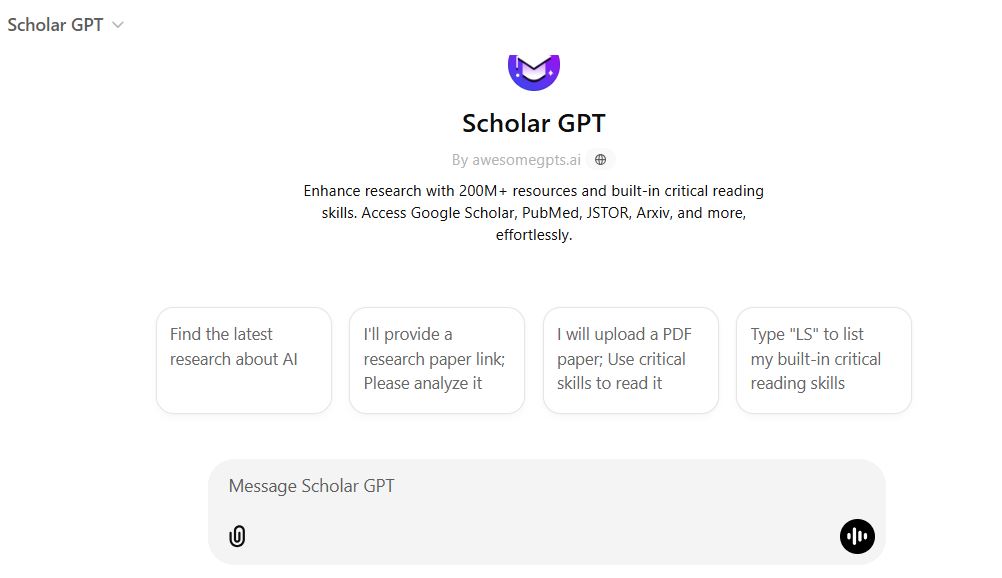In the rapidly evolving landscape of academia, the demand for efficient and effective research tools has never been greater. Enter Scholar GPT, a cutting-edge AI-driven platform designed to assist students, researchers, and academics in navigating the complexities of scholarly work. This innovative tool leverages advanced natural language processing capabilities to provide tailored support, making it an invaluable resource for those engaged in academic pursuits.

As the academic world becomes increasingly competitive, the need for reliable assistance in research, writing, and data analysis is paramount. Scholar GPT aims to bridge this gap by offering a comprehensive suite of features that streamline the research process. In this review, we will delve into the functionalities of Scholar GPT, compare it with other AI tools, and explore user experiences to determine its effectiveness as an academic assistant.
Scholar GPT is an advanced Artificial Intelligence (AI) tool specifically designed to assist with academic research and scholarly activities. Unlike its predecessor, ChatGPT, which is primarily focused on casual conversations, Scholar GPT is tailored to provide in-depth, detailed answers and problem-solving assistance across various academic fields. It is important to understand the differences between ChatGPT and Scholar GPT to know which one suitable for you.

Scholar GPT, a specialized version of ChatGPT, leverages a vast array of online resources, including Google Scholar, PubMed, JSTOR, and Arxiv, to deliver accurate and comprehensive information to users. Its primary goal is to streamline the research process for students, educators, and nonprofit organizations by offering reliable data analysis and sourcing capabilities. With access to over 200 million peer-reviewed papers, Scholar GPT enhances the research experience by providing built-in critical reading skills that help users navigate complex academic content. This innovative tool not only simplifies the process of finding relevant literature but also aids in understanding and synthesizing information, making it an invaluable resource for anyone engaged in scholarly work.
Scholar GPT stands out in the realm of academic assistance due to its extensive database access, which encompasses over 200 million resources from reputable platforms such as Google Scholar, PubMed, JSTOR, and Arxiv. This vast repository allows users to source academic papers and research journal articles efficiently, ensuring that they have access to the most relevant and up-to-date information for their research needs.
Furthermore, Scholar GPT is equipped with real-time data updates, which means that users can rely on the tool to provide the latest findings and developments in their respective fields, enhancing the overall quality of their academic work.
Another significant feature of Scholar GPT is its advanced problem-solving capabilities, which leverage natural language processing to tackle complex academic queries. This functionality enables users to generate research questions, create summaries, and even write and run Python code for data analysis.
The ability to perform advanced data analysis and handle image conversions adds an extra layer of versatility, making Scholar GPT an invaluable tool for researchers and students alike.
Scholar GPT offers a free version that allows users to explore its capabilities without any financial commitment. This free access is particularly appealing to students and researchers who may be hesitant to invest in a subscription without first understanding the tool’s effectiveness.
However, while the free version provides a glimpse into the platform’s features, it is essential to recognize that it comes with limitations. Users may find that certain advanced functionalities, such as access to extensive databases and enhanced critical reading skills, are restricted, which could hinder their research experience.
On the other hand, the free version of Scholar GPT can still be beneficial for basic academic tasks. It allows users to generate summaries, formulate research questions, and gain insights into various topics. For those who are just starting their academic journey or need occasional assistance, the free version may suffice.
However, for serious researchers or students who require comprehensive support, the subscription plan, which costs $20 per month, may be a more worthwhile investment. Ultimately, the decision to use the free version of Scholar GPT depends on individual needs and the depth of academic assistance required.
When comparing Scholar GPT and Chat GPT, it is essential to consider their unique strengths and weaknesses, particularly in the context of academic assistance. The table below outlines these differences, highlighting their respective features, performance, and suitability for various tasks.
| Feature | Scholar GPT | Chat GPT |
|---|
| Purpose | Tailored for academic assistance, focusing on researchers and students. | General-purpose AI for diverse conversational applications. |
| Specialization | Excels in scholarly tasks such as generating research questions, summarizing academic papers, etc. | Versatile but lacks focus on academic-specific functionalities. |
| Depth of Knowledge | Superior in specialized academic inquiries, particularly in the humanities and social sciences. | Broad knowledge base with improvements in depth (e.g., GPT-4) but less focused on academic rigor. |
| Response Accuracy | High accuracy in contextually appropriate and coherent responses for complex academic topics. | Significant improvements in accuracy but not consistently specialized for academia. |
| Performance Metrics | Demonstrates superior response time and reliability for scholarly topics. | Offers competitive response time with breadth but may falter in academic specificity. |
| Unique Features | Context-aware academic tools, including citation generation and summarization of research. | Strong conversational capabilities and creative content generation. |
| Target Audience | Researchers, students, and academics seeking precise and in-depth assistance. | General users needing broad and versatile conversational assistance. |
| Humanities and Social Sciences | Excels in generating coherent responses and contextual understanding in these fields. | Competent but may not match Scholar GPT in academic contextual depth. |
| Ease of Use for Scholars | Provides a streamlined experience tailored to academic workflows. | Less streamlined for specialized academic tasks. |
| Overall Suitability | Best suited for scholarly work and academic success. | Ideal for general-purpose use with occasional academic utility. |
Scholar GPT presents a range of advantages that make it a valuable tool for students and researchers alike. One of its most significant benefits is its strong text generation capabilities, which allow users to create summaries and generate research questions based on specific topics. This feature not only saves time but also enhances the quality of academic work by providing a solid foundation for further exploration.
Additionally, Scholar GPT’s ability to identify legitimate sources through its plugin functionality ensures that users have access to reliable information, which is crucial for academic integrity and the overall credibility of research.
However, Scholar GPT is not without its drawbacks. One notable concern is the potential for over-reliance on AI-generated content, which may hinder the development of critical thinking and writing skills among students.
Furthermore, while the tool excels in generating text, it may not always provide the depth of analysis that a human expert could offer. Users must also be cautious about the accuracy of the information provided, as the AI’s output is only as good as the data it has been trained on. Balancing the use of Scholar GPT with traditional research methods such as consulting reputable academic journal sites is essential to maximize its benefits while mitigating its limitations.
In conclusion, Scholar GPT emerges as a groundbreaking tool that has the potential to revolutionize the way academic assistance is approached. With its advanced AI capabilities, it offers a unique blend of efficiency and depth, catering to the diverse needs of students, researchers, and educators alike. The ability to generate insightful content, assist in research, and provide tailored academic support makes it a valuable asset in the academic landscape. However, while the benefits are substantial, users must also consider the limitations and challenges that come with relying on AI for academic purposes.
Ultimately, the decision to integrate Scholar GPT into your academic routine should be based on a careful evaluation of its features, user experiences, and your specific needs. As the landscape of academic assistance continues to evolve, Scholar GPT stands out as a promising option, but it is essential to approach it with a critical mindset. Balancing the advantages with the potential drawbacks will ensure that you make the most of this innovative tool, paving the way for a more efficient and effective academic journey. However, if you require more advanced tools for in-depth research and precise data analysis, you may want to explore Scholar AI for a more comprehensive and tailored academic experience.